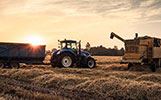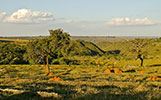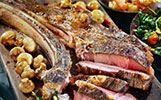| The Global Effort to Make Beef More Sustainable
Leon Kaye, Triple Pundit | April 28, 2016
The global beef industry has taken notice of the shifting market, and companies across its value chain have formed a coalition, the Global Roundtable for Sustainable Beef (GRSB). This organization, which includes growers, producers, restaurants and retailers, promises an agenda of "continuous improvement in sustainability" that it says will ensure the industry will become more environmentally responsible, socially conscious and economically viable.
To learn more about the Global Roundtable on Sustainable Beef and its aims, 3p spoke with the organization's executive director, Ruaraidh Petre, by telephone while he was traveling in Europe. Read Interview HERE.
Intense Farming Practices Can Help Save Wildlife 
Richard Conniff, Take Part | April 15, 2016
You probably don't think agricultural intensification could ever be a good thing, and you certainly wouldn't expect an argument for more of it in a column about wildlife. But here's the deal: If we don't figure out how to grow more food on less land, we're going to have to plow under what little remains of the natural world and turn it into farmland.
We have to figure it out fast, because there are going to be 10 billion people to feed by mid–century.
Stop Wasting Food to Slow Global Warming
Niina Heikkinen, Scientific American | April 20, 2016
If Americans made changes to their diets and stopped wasting food, they could reduce greenhouse gas emissions and help conserve global natural resources, experts say.
Cutting down on milk and meat protein are top ways to lower an individual's carbon footprint, said Janet Ranganathan, vice president of science and research at the World Resources Institute.
Sustainability in the Beef Industry
Southeast AgNet | April 22, 2016
Sustainability is a word we hear more and more of and an issue many in agriculture continue to deal with. Dr. Kim Stackhouse–Lawson, executive director of global sustainability for the National Cattlemen's Beef Association, says there are a lot of issues when we talk sustainability, but one of the top ones is food waste. Listen to audio interview HERE.
How Much Water Does it Take to Produce Meat? 
The Cattle Site | April 26, 2016
According to the World Wildlife Fund, water used for livestock production is expected to rise by 50 per cent by 2025 and at present it accounts for 15 per cent of all irrigated water. The global average water footprint of beef is 15,400 litres per kilo, which is predominantly green water – water from renewable sources – (94 per cent). The water footprint related to animal feed takes the largest share with 99 per cent of the total, while drinking and service water contribute just one per cent to the total water footprint. However, drinking water is 30 per cent of the blue water footprint.
Zero Deforestation and Meat–Rich Diets – Possible But Very Tricky
David Burrows, Food Navigator | April 21, 2016
Fear not – nine billion people can be fed by 2050 without further deforestation. The claim comes from researchers at the Global Institute of Social Ecology in Vienna, Austria. The team assessed 500 different scenarios in a "hypothetical world of zero deforestation", combining technological advancements, changes to agricultural systems and shifts in consumption patterns. Of the 500, around 60% are feasible, said one of the study's authors, Karlheinz Erb. "We find that many options exist to meet the global food supply in 2050 without deforestation, even at low crop–yield levels," the researchers noted.
The findings indicate that "deforestation is not a precondition for supplying the world with sufficient food in terms of quantity and quality in 2050 and that many options exist based on different strategies", according to the paper published in Nature Communications.
The Four Commodities Driving Global Deforestation 
Leon Kay, Triple Pundit | April 21, 2016
Depending on the sources cited, 10 to 15 crops comprise the majority of food and consumer products consumed worldwide. And the methods used to raise many of these foods have created global supply chains that are not sustainable in the long run, from their effects on water supplies to their impacts on labor and land rights. Now, the nonprofit science advocacy organization, the Union for Concerned Scientists (UCS), suggests that four commodities alone are responsible for the majority of deforestation worldwide. They also happen to be commodities backed by powerful business interests. These big four, according to UCS, are beef, soybeans, palm oil and, not surprisingly, wood products.
Denmark Ethics Council Calls For Tax on Red Meat To Fight 'Ethical Problem' Of Climate Change 
Adam Withnall, Independent UK | April 27, 2016
Denmark is considering proposals to introduce a tax on red meat, after a government think tank came to the conclusion that "climate change is an ethical problem". The Danish Council of Ethics recommended an initial tax on beef, with a view to extending the regulation to all red meats in future. It said that in the long term, the tax should apply to all foods at varying levels depending on climate impact.
The council voted in favour of the measures by an overwhelming majority, and the proposal will now be put forward for consideration by the government. | |
